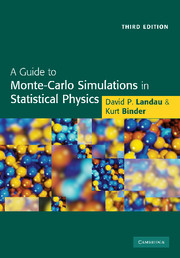Book contents
- Frontmatter
- Contents
- Preface
- 1 Introduction
- 2 Some necessary background
- 3 Simple sampling Monte Carlo methods
- 4 Importance sampling Monte Carlo methods
- 5 More on importance sampling Monte Carlo methods for lattice systems
- 6 Off-lattice models
- 7 Reweighting methods
- 8 Quantum Monte Carlo methods
- 9 Monte Carlo renormalization group methods
- 10 Non-equilibrium and irreversible processes
- 11 Lattice gauge models: a brief introduction
- 12 A brief review of other methods of computer simulation
- 13 Monte Carlo simulations at the periphery of physics and beyond
- 14 Monte Carlo studies of biological molecules
- 15 Outlook
- Appendix: listing of programs mentioned in the text
- Index
8 - Quantum Monte Carlo methods
Published online by Cambridge University Press: 28 February 2011
- Frontmatter
- Contents
- Preface
- 1 Introduction
- 2 Some necessary background
- 3 Simple sampling Monte Carlo methods
- 4 Importance sampling Monte Carlo methods
- 5 More on importance sampling Monte Carlo methods for lattice systems
- 6 Off-lattice models
- 7 Reweighting methods
- 8 Quantum Monte Carlo methods
- 9 Monte Carlo renormalization group methods
- 10 Non-equilibrium and irreversible processes
- 11 Lattice gauge models: a brief introduction
- 12 A brief review of other methods of computer simulation
- 13 Monte Carlo simulations at the periphery of physics and beyond
- 14 Monte Carlo studies of biological molecules
- 15 Outlook
- Appendix: listing of programs mentioned in the text
- Index
Summary
INTRODUCTION
In most of the discussion presented so far in this book, the quantum character of atoms and electrons has been ignored. The Ising spin models have been an exception, but since the Ising Hamiltonian is diagonal (in the absence of a transverse magnetic field!), all energy eigenvalues are known and the Monte Carlo sampling can be carried out just as in the case of classical statistical mechanics. Furthermore, the physical properties are in accord with the third law of thermodynamics for Ising-type Hamiltonians (e.g. entropy S and specific heat vanish for temperature T → 0, etc.) in contrast to the other truly classical models dealt with in previous chapters (e.g. classical Heisenberg spin models, classical fluids and solids, etc.) which have many unphysical low temperature properties. A case in point is a classical solid for which the specific heat follows the Dulong–Petit law, C = 3NkB, as T → 0, and the entropy has unphysical behavior since S → −∞. Also, thermal expansion coefficients tend to non-vanishing constants for T → 0 while the third law implies that they must be zero. While the position and momentum of a particle can be specified precisely in classical mechanics, and hence the groundstate of a solid is a perfectly rigid crystal lattice (motionless particles localized at the lattice points), in reality the Heisenberg uncertainty principle forbids such a perfect rigid crystal, even at T → 0; due to zero point motions which ‘smear out’ the particles over some region around these lattice points.
- Type
- Chapter
- Information
- A Guide to Monte Carlo Simulations in Statistical Physics , pp. 285 - 323Publisher: Cambridge University PressPrint publication year: 2009



